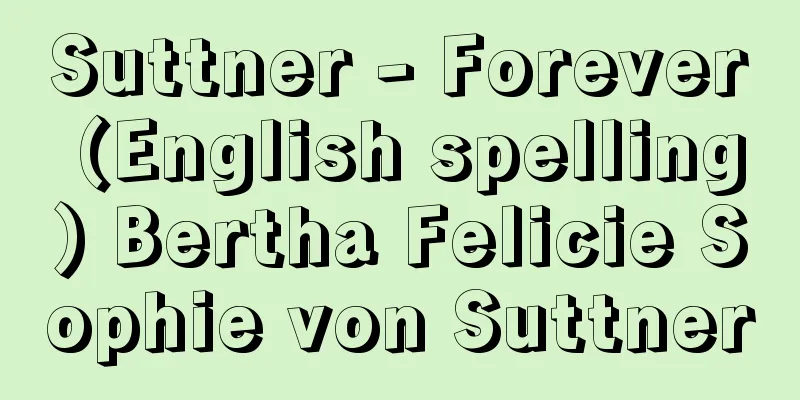Suttner - Forever (English spelling) Bertha Felicie Sophie von Suttner

|
Austrian writer and pacifist. Born in Prague in the Austrian Empire as the daughter of the Kinsky family. Her father was a field marshal, but he died before she was born, so she was raised by her mother. In 1876, she married Baron Arthur Gundaccar von Suttner (1850-1902), and they both became famous writers. Before her marriage, she served as secretary to Nobel, who created the Nobel Prize, for a short period of time, and continued to have contact with him afterwards. It is said that the establishment of the Nobel Peace Prize was due in no small part to her influence. In 1889, she published her novel "Lay Down Your Weapons!" ( Die Waffen nieder) , which depicts a heroine who endures the horrors of war, and it caused a worldwide sensation. From this time on, she actively participated in the peace movement, and in 1891 she founded the Austrian Peace Association. She later joined many peace organizations and appealed for peace through her lectures and writing. In 1905, she became the first woman to receive the Nobel Peace Prize, and continued to work tirelessly for peace thereafter, but she died in June 1914, before the outbreak of World War I, the thing she feared most. [Editorial Department] "Suttner Study Group translation of "Drop Your Weapons!" Volumes 1 and 2 (2011, Shin Nihon Shuppansha)" [Reference] |Source: Shogakukan Encyclopedia Nipponica About Encyclopedia Nipponica Information | Legend |
|
オーストリアの作家、平和主義者。キンスキー伯爵家の令嬢として、オーストリア帝国のプラハに生まれる。父は陸軍元帥であったが、彼女が生まれる前に死去し、母の手で育てられた。1876年に男爵アルトゥール・フォン・ズットナーArthur Gundaccar von Suttner(1850―1902)と結婚、ともに著述家として知られるようになった。短期間であるが結婚前に、ノーベル賞をつくったノーベルの秘書を務めており、その後もノーベルとは交流が続いた。ノーベル賞に平和賞が設けられたのは、彼女の影響が少なくないとされている。1889年に戦争の恐怖に耐えるヒロインを描いた小説『武器を捨てよ!』Die Waffen niederを出版、世界的反響をよんだ。このときから彼女は平和運動に積極的に参加し、1891年オーストリア平和協会を設立、その後も多くの平和団体に参加し、講演、執筆活動を通じて平和を訴えた。1905年女性として初めてノーベル平和賞を受賞、以後も休むことなく平和運動を続けたが、彼女がもっとも恐れていた第一次世界大戦が始まる前の1914年6月に死去した。 [編集部] 『ズットナー研究会訳『武器を捨てよ!』上下(2011・新日本出版社)』 [参照項目] |出典 小学館 日本大百科全書(ニッポニカ)日本大百科全書(ニッポニカ)について 情報 | 凡例 |
<<: Suppiluliuma (English spelling)
Recommend
Indirect Priming
… Priming in which the same stimulus appears twic...
Preuss, H. (English spelling) PreussH
...This constitution is called the Weimar Constit...
Mṛgadāva (English spelling) Mrgadava
…A garden in the ancient Indian state of Kashi, w...
Domestic cat - Ieneko (English spelling)
A mammalian animal in the order Carnivora, family...
Derbesia ryukyuensis (English spelling) Derbesiaryukyuensis
…[Mitsuo Chihara]. . . *Some of the terminology t...
Auric acid
This refers to a substance written as HAu(OH) 4 ,...
Pekkanen - Toivo Rikhart Pekkanen
Finland's first proletarian writer. After gra...
quickly adapting
...It has been confirmed that a phenomenon equiva...
Bohemian glass
Glass art developed in the Bohemia region of Centr...
Isobe Shiro
Year of death: September 1, 1923 Year of birth: Ju...
Gurlitt, W.
…However, what cannot be overlooked at the same t...
Herbarium - Herbarium (English spelling)
A place where botanical specimens are stored and u...
Shobogenzo - Shobogenzo
A Buddhist book from the Kamakura period. Written...
The Diary of Lord Tsunetoshi
This is the diary of Chunagon Fujiwara Tsunetoshi ...
Leave of absence allowance - leave of absence allowance
This is an allowance that an employer is obligate...









